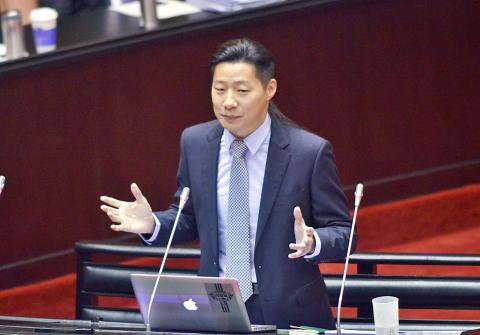New Party Power (NPP) Legislator Freddy Lim (林昶佐) yesterday criticized President Ma Ying-jeou’s (馬英九) oft-trumpeted principles of equality and dignity in cross-strait relations, saying Taiwan has always been belittled under Ma’s administration.
Taking part in his first interpellation session at the legislature in the morning, which lasted about 30 minutes, Lim drew attention to the issues of Taiwan’s national identity, transitional justice and discriminatory comments toward Tao Aborigines in the film David Loman 2 (大尾鱸鰻2).
“For the past eight years, the Ma administration has insisted that cross-strait ties be furthered based on the so-called ‘1992 consensus’ and the ‘one China, different interpretations’ initiative,” Lim said after calling on Premier Simon Chang (張善政) for questioning.

Photo: Wang Yi-song, Taipei Times
The “1992 consensus,” a term former Mainland Affairs Council chairman Su Chi (蘇起) admitted making up in 2000, refers to an understanding between the Chinese Nationalist Party (KMT) and Chinese government that both sides of the Taiwan Strait acknowledge that there is “one China,” with each side having its own interpretation of what “China” means.
Ma had defined the cross-strait relationship as a “non-state-to-state special relationship” that he said should be maintained under the principles of equality and dignity, Lim said.
“By the president’s logic, as Taiwan is called ‘Chinese Taipei’ in international arenas, should China not also be belittled and called ‘Chinese Beijing?’” Lim said.
“Have you ever consider pressuring China into changing its name to Chinese Beijing and forbidding it to hoist its national flag and singing its national anthem at international events?” he asked Chang.
Lim said the equality and dignity many Taiwanese, including himself, aspire to see is Taiwan and China being treated equally as two separate and normal nations.
The singer-turned-politician then asked Chang and Mainland Affairs Council Minister Andrew Hsia (夏立言) what the most befitting titles for Taiwan and China at international events are if they are to conform to the principles of equality and dignity.
Chang said that under the Republic of China’s (ROC) Constitution, the ROC is a nation and that its government does not recognize the other side of the Taiwan Strait as a sovereign state.
“When it comes to international organizations, not everything can go as we wish. What they prefer to call Taiwan and China are their decisions, but Chinese Taipei is an appellation that enables us to participate in international sports events,” Chang said.
Hsia said the government has been striving to allow Taiwan to attend international events using its official title.
“If your ultimate goal is to see the coexistence of both the ROC and People’s Republic of China, then you are referring to the ‘two-state theory’ and a world where there are two Chinas. That makes you a supporter of ‘ROC independence,’” the NPP lawmaker said.
As a champion of “Taiwanese independence” himself, Lim said that he admired Hsia for going against Ma’s stance and being an advocate of “ROC independence.”
Many things might come out of the “1992 consensus” and the “one China, with different interpretations” initiative, but never equality and dignity, Lim said.
He said that since Taiwanese used their votes against Ma’s China-leaning stance and the “1992 consensus” in last month’s elections, Beijing should refrain from resorting to “despicable measures” just because the incoming government of president-elect Tsai Ing-wen (蔡英文) does not support the “consensus.”

Alain Robert, known as the "French Spider-Man," praised Alex Honnold as exceptionally well-prepared after the US climber completed a free solo ascent of Taipei 101 yesterday. Robert said Honnold's ascent of the 508m-tall skyscraper in just more than one-and-a-half hours without using safety ropes or equipment was a remarkable achievement. "This is my life," he said in an interview conducted in French, adding that he liked the feeling of being "on the edge of danger." The 63-year-old Frenchman climbed Taipei 101 using ropes in December 2004, taking about four hours to reach the top. On a one-to-10 scale of difficulty, Robert said Taipei 101

Nipah virus infection is to be officially listed as a category 5 notifiable infectious disease in Taiwan in March, while clinical treatment guidelines are being formulated, the Centers for Disease Control (CDC) said yesterday. With Nipah infections being reported in other countries and considering its relatively high fatality rate, the centers on Jan. 16 announced that it would be listed as a notifiable infectious disease to bolster the nation’s systematic early warning system and increase public awareness, the CDC said. Bangladesh reported four fatal cases last year in separate districts, with three linked to raw date palm sap consumption, CDC Epidemic Intelligence

Two Taiwanese prosecutors were questioned by Chinese security personnel at their hotel during a trip to China’s Henan Province this month, the Mainland Affairs Council (MAC) said yesterday. The officers had personal information on the prosecutors, including “when they were assigned to their posts, their work locations and job titles,” MAC Deputy Minister and spokesman Liang Wen-chieh (梁文傑) said. On top of asking about their agencies and positions, the officers also questioned the prosecutors about the Cross-Strait Joint Crime-Fighting and Judicial Mutual Assistance Agreement, a pact that serves as the framework for Taiwan-China cooperation on combating crime and providing judicial assistance, Liang

US climber Alex Honnold left Taiwan this morning a day after completing a free-solo ascent of Taipei 101, a feat that drew cheers from onlookers and gained widespread international attention. Honnold yesterday scaled the 101-story skyscraper without a rope or safety harness. The climb — the highest urban free-solo ascent ever attempted — took just more than 90 minutes and was streamed live on Netflix. It was covered by major international news outlets including CNN, the New York Times, the Guardian and the Wall Street Journal. As Honnold prepared to leave Taiwan today, he attracted a crowd when he and his wife, Sanni,